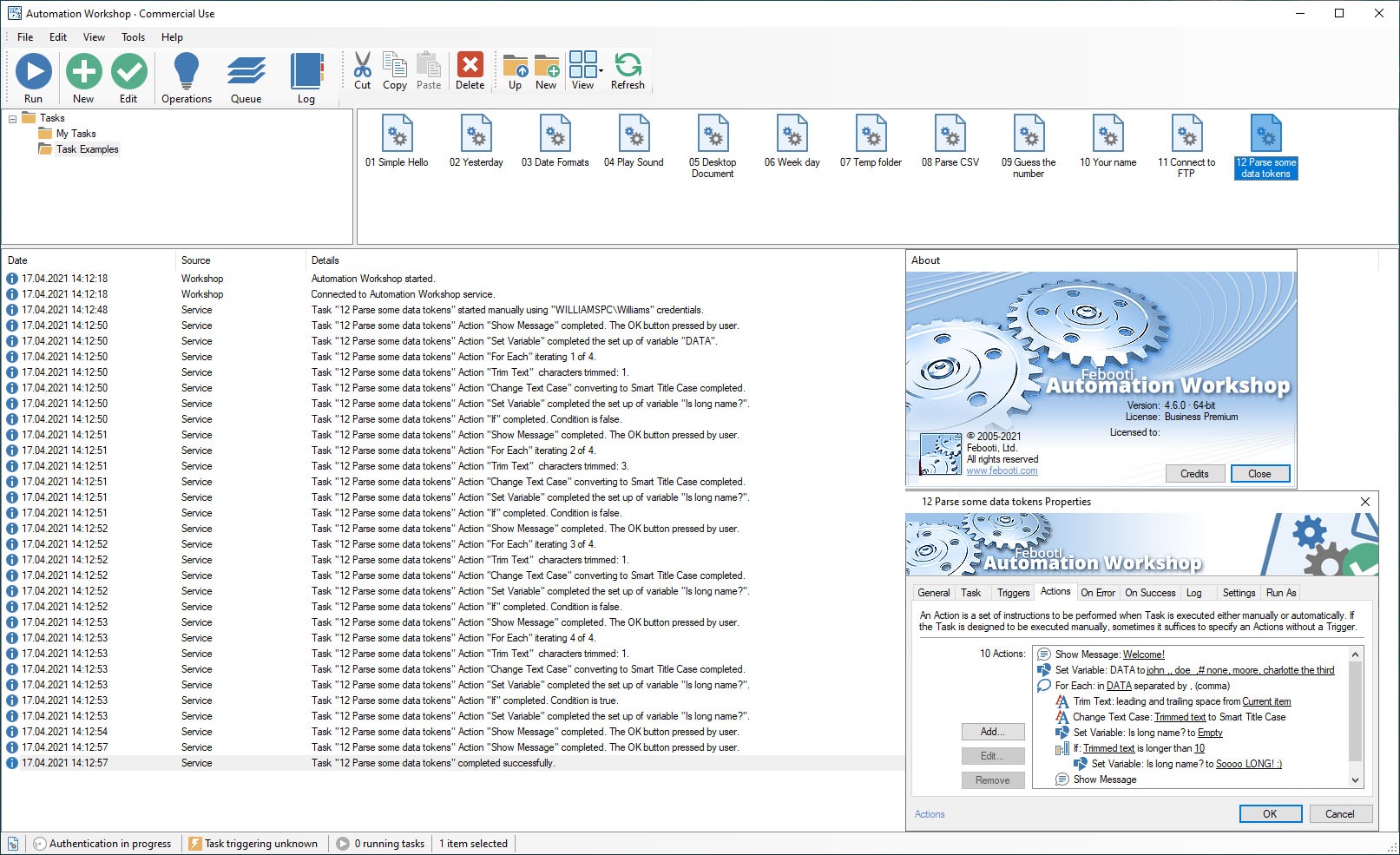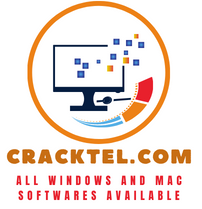Automation Workshop 7.1.0 Crack With Patch Free Download 2024
What is an Automation Workshop?
An Automation workshop Crack is a space or event where people can learn about and experiment with different tools and techniques for automating various tasks and processes. These workshops can focus on different types of automation, such as robotic process automation (RPA), workflow automation, or test automation, and may cover a range of tools and technologies, including scripting languages, low-code platforms, and machine learning.
During an automation workshop, participants typically work through hands-on exercises and projects designed to help them understand the concepts and tools involved in automation and to develop their skills in implementing and managing automation solutions. Workshops may be led by experts in automation or by peers who have experience with automation and are willing to share their knowledge and best practices.
Some common topics covered in automation workshops include:
- Introduction to automation and its benefits
- Overview of different types of automation and their applications
- Hands-on experience with automation tools and platforms
- Strategies for Identifying Automation Opportunities
- Best practices for designing and implementing automation solutions
- Challenges and considerations for scaling and maintaining automation solutions
- Case studies and examples of successful automation projects
Automation workshops can be valuable for individuals and organizations looking to improve efficiency, reduce costs, and increase productivity through automation. By participating in these workshops, attendees can gain a better understanding of automation and its potential, and develop the skills needed to implement automation solutions in their own work environments.

Automation Workshop Key Features:
Here are some key features of an automation workshop:
- Hands-on exercises: Automation workshops typically involve hands-on exercises that allow participants to apply the concepts and tools they learn in a practical setting. These exercises may involve creating and testing automation scripts or workflows, using automation platforms to build and deploy applications, or working with datasets to develop machine learning models.
- Expert guidance: Workshops are often led by experts in automation who can provide guidance and support as participants work through exercises and projects. These experts may be industry professionals, instructors, or experienced practitioners who can share best practices and provide feedback and advice.
- Collaborative learning: Automation workshops often encourage collaboration and teamwork among participants. This can include pairing or small group exercises, peer review and feedback sessions, or group projects that require participants to work together to solve a problem or achieve a goal.
- Accessible tools and platforms: Automation workshops typically provide access to the tools and platforms needed to complete exercises and projects. These may include programming languages and IDEs, automation platforms, and tools, or cloud-based services and APIs.
- Case studies and real-world examples: Workshops often include case studies and examples of successful automation projects to illustrate how automation can be applied in real-world settings. These examples can help participants understand the benefits and challenges of automation, and provide inspiration for their own projects.
- Continuous learning: Automation workshops may be just the beginning of a journey toward automation mastery. To that end, workshops may provide resources for further learning, including online tutorials, webinars, and discussion forums. Participants may also be encouraged to continue practicing and experimenting with automation techniques and tools beyond the workshop.
What’s New In Automation Workshop?
However, in general, the field of automation is constantly evolving and new technologies, tools, and techniques are being developed all the time. Here are some recent trends and developments in the world of automation:
- AI-powered automation: Artificial intelligence (AI) and machine learning (ML) are increasingly being used to automate complex processes and decision-making. These technologies can help improve the accuracy and efficiency of automation solutions and enable automation to handle more diverse and dynamic inputs.
- Low-code platforms: Low-code platforms enable non-technical users to build and deploy automation solutions without needing extensive programming knowledge. These platforms typically provide visual interfaces for designing workflows, integrating with other systems, and automating tasks.
- Process discovery and optimization: Tools for process discovery and optimization can help identify inefficient or error-prone processes that can be automated, and suggest ways to streamline them. These tools can also help monitor and analyze processes over time to identify areas for improvement.
- Cloud-based automation: Cloud-based automation solutions enable organizations to scale and deploy automation more easily and cost-effectively. These solutions typically provide access to pre-built automation workflows and integrations, as well as the ability to build custom workflows using visual tools.
- Robotics process automation (RPA): RPA is a type of automation that uses software bots to automate repetitive and rule-based tasks. RPA is increasingly being used in industries such as finance, healthcare, and manufacturing to reduce costs and improve efficiency.
Overall, automation is becoming more accessible, powerful, and integrated with other systems and technologies. As a result, organizations are finding new ways to leverage automation to drive business value and achieve their goals.
Automation Workshop PROS:
There are several advantages to attending or hosting an automation workshop, including:
- Increased efficiency and productivity: By learning how to automate routine and repetitive tasks, attendees can free up time and resources to focus on higher-value activities. Automation can also reduce errors and improve consistency, leading to greater efficiency and productivity.
- Cost savings: Automation can help reduce labor costs by automating tasks that would otherwise require manual effort. It can also reduce the risk of errors and associated costs, such as rework or fines.
- Improved quality: Automation can help ensure that processes are executed consistently and accurately, leading to improved quality and customer satisfaction.
- Access to new technologies: Automation workshops often provide access to new technologies and tools that attendees may not have been exposed to before. This can help attendees stay current with industry trends and improve their skills.
- Collaboration and networking: Automation workshops provide opportunities for attendees to collaborate with peers and share knowledge and best practices. This can lead to new insights and ideas, as well as potential partnerships or collaborations.
- Competitive advantage: By adopting automation and staying ahead of industry trends, organizations can gain a competitive advantage and differentiate themselves in the market.
Overall, automation workshops can provide attendees with the skills, knowledge, and tools needed to implement automation solutions that drive business value and improve efficiency, quality, and customer satisfaction.
Automation Workshop CONS:
While there are many benefits to attending or hosting an automation workshop, there are also some potential drawbacks to consider:
- Upfront costs: Depending on the workshop, there may be upfront costs associated with attendance or hosting, such as registration fees or equipment and software expenses.
- Time investment: Automation workshops can be time-intensive, requiring attendees to commit several hours or days to the training. This can be a challenge for busy professionals or organizations with tight schedules.
- Technical complexity: Automation workshops may involve technical concepts and tools that can be challenging for non-technical attendees to grasp. This can lead to frustration or difficulties in implementing the skills or concepts learned in the workshop.
- Limited customization: Automation workshops may provide pre-built workflows or solutions that are not easily customizable to specific business needs. This can limit the ability of attendees to tailor the automation solutions to their unique requirements.
- Integration challenges: Automation solutions may need to integrate with existing systems, which can be challenging if the systems are not compatible or if there are data or security concerns.
- Maintenance and updates: Automation solutions require ongoing maintenance and updates, which can be time-consuming and require technical expertise. Organizations need to ensure they have the resources and processes in place to maintain and update their automation solutions.
Overall, the benefits of attending or hosting an automation workshop typically outweigh the potential drawbacks, but it’s important to consider these factors when deciding whether to participate in a workshop or implement an automation solution.
Screenshot:

Automation Workshop System Requirements:
The system requirements for an automation workshop will depend on the specific software or tools being used. However, here are some general requirements that may be needed:
- Operating System: The workshop software may require a specific operating system, such as Windows, Linux, or macOS.
- Processor: The processor should meet the minimum requirements for the software being used. Most automation software can run on modern processors.
- Memory: The memory requirements for the software may vary depending on the complexity of the workflows being built. Generally, a minimum of 4GB of RAM is recommended.
- Hard disk space: Sufficient hard disk space is necessary to install and run the automation software and any associated tools or libraries. Typically, at least 1GB of free disk space is required.
- Internet Connection: An internet connection may be required for downloading and installing software, as well as accessing online resources or support.
- Software dependencies: Some automation software may have specific software dependencies, such as .NET Framework or Python. These dependencies should be installed prior to using the software.
- Graphics card: Some automation software may require a dedicated graphics card for graphical processing or rendering.
- Additional hardware: Depending on the nature of the automation workshop, additional hardware such as sensors or microcontrollers may be required.
It’s important to check the system requirements for the specific automation software or tools being used in the workshop to ensure that the system meets the minimum requirements for installation and optimal performance.
How To Install Automation Workshop?
The installation process for Automation Workshop may vary depending on the version and operating system you are using, but generally, the process will involve the following steps:
- Download the installation file: Go to the Automation Workshop website and download the installation file that is appropriate for your operating system.
- Run the installation file: Double-click on the downloaded file to start the installation process. If prompted, select the language you prefer.
- Accept the license agreement: Read through the license agreement and accept the terms and conditions.
- Choose the installation location: Choose the location on your computer where you want to install the software.
- Select the components to install: Choose the components that you want to install, such as the Automation Workshop Manager, Automation Workshop Service, or Automation Workshop Agent.
- Configure settings: Configure any additional settings as required, such as the service account, startup options, or other options depending on the version and edition.
- Finish the installation: Click on the Install button and wait for the installation process to complete.
- Launch the software: Once the installation is complete, launch the software and start using it.
It’s important to follow the instructions carefully during the installation process and to ensure that your system meets the minimum requirements for the software. Additionally, be sure to download the software from a trusted source to ensure its authenticity and security.
FAQs
Q. What is the cost of attending an automation workshop?
The cost of attending an automation workshop can vary depending on factors like the duration, location, and expertise of the instructors. It is advisable to research and choose a workshop that fits your budget and needs.
Q. Are automation workshops only for IT professionals?
No, automation workshops cater to a wide audience. While IT professionals can benefit greatly, individuals from various backgrounds, including business, finance, and marketing, can also find value in automation workshops.
Q. Do I need prior knowledge of automation to attend a workshop?
No prior knowledge is required. Automation workshops are designed to accommodate participants with various levels of expertise, from beginners to experienced professionals.
Q. How can I stay updated on upcoming automation workshops?
You can stay informed about upcoming automation workshops by subscribing to industry newsletters, following automation experts on social media, and checking event platforms or websites that list upcoming workshops.
Q. Can automation workshops be customized for specific industries?
Yes, many automation workshops can be tailored to specific industries and business needs. It’s essential to discuss your requirements with the workshop organizers to ensure the content aligns with your goals.
Conclusion
Automation workshops are an invaluable resource for businesses aiming to stay ahead in an increasingly competitive environment. By attending these workshops, professionals can learn how to harness the power of automation, leading to increased productivity and efficiency.
Automation Workshop 7.1.0 Crack Full Setup Free Download 2024 From the Link Given Below:
Password is: www.cracktel.com

![DEVONthink Pro 3.9.1 Crack Mac Full License Key [Latest] 2024](https://cracktel.com/wp-content/uploads/2022/10/png-transparent-macbook-pro-devonthink-document-management-system-macos-though-far-apart-spiral-eye-iris-thumbnail-360x265.png)

